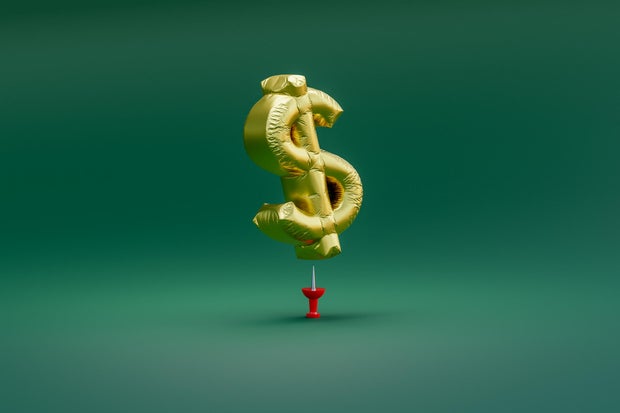
Inflation has sapped Americans' financial security, Federal Reserve finds
Americans' sense of economic security deteriorated sharply in 2022, with more than a third of adults saying they were worse off financially than a year prior, the Federal Reserve said Monday.
The findings, outlined in an annual survey on people's economic well-being, underlines the severe hardship caused by scorching inflation. Higher prices continued to hurt most households last year, with 73% of adults reporting that they were staying afloat, down from 78% in 2021.
More troubling, 35% of those polled said their financial situation deteriorated last year — the highest level since the Fed started asking about people's well-being in 2014. The survey of more than 11,000 was conducted in October 2022.
Although inflation has cooled since peaking last June, prices remain well above the Fed's target annual rate of 2%. The consumer price index — a broad basket of goods and services — rose in April at an annual rate of 4.9%. Core inflation, which excludes volatile energy and food costs, increased at a 5.5% rate.
Roughly two-thirds of adults stopped using a product or used less of it because of inflation, while 64% switched to a cheaper item, the Fed found.
Inflation surges, then cools
Increases in the Consumer Price Index peaked last June and have been slowing since.
Apr2021JulOctJan2022AprJulOctJan2023Apr0.01.02.03.04.05.06.07.08.0%Core CPIAug 1, 20226.3%Core CPIAug 1, 20226.3%
Core CPI
CPI - all items
Chart: Irina Ivanova Source: Bureau of Labor Statistics Download image
One clear barometer of Americans' financial fragility, according to the survey: Only 63% of those surveyed said they had enough cash to cover an emergency $400 expense, down 5 percentage points from 2021. Of that total, 18% said the largest expense they could handle with savings was $100.
More people also described having a harder time putting money away for retirement: 31% of those polled last fall said their savings plan was on track, down from 40% the previous year.
A recent survey by Bankrate found that more than half of those polled said that factors including inflation, rising interest rates and unstable income are hurting their mental health.
We may receive commissions from some links to products on this page. Promotions are subject to availability and retailer terms.
MONEYWATCH: MANAGING YOUR MONEY
As inflation cools, should you still invest in gold?
BY MATT RICHARDSON
MAY 18, 2023 / 4:27 PM / CBS NEWS

Gold can still be a reliable investment even if the inflation bubble may soon burst. GETTY IMAGES
The Federal Reserve raised interest rates once again this month, marking the tenth such hike since March 2022. While the bump to a range between 5% and 5.25% wasn't a positive development for borrowers, there has been some other encouraging news.
Inflation fell below the 5% threshold for the first time since June 2021. Food inflation is also easing. The unemployment rate, meanwhile, dropped to 3.4%, according to the Labor Department, after the U.S. added 253,000 jobs in April.
In this environment, some Americans may be restructuring their investments. Gold, for example, has always been considered a reliable hedge against inflation. But is still worth pursuing in light of recent developments or should investors look elsewhere?
Start by exploring your gold options with a free investors kit to see if it makes sense for you.
As inflation cools should you still invest in gold?
Yes, inflation may (hopefully) may be subsiding. But that doesn't mean you should ditch your gold investing plans. It can actually still be a smart place to park some of your money. Here are three reasons why you should continue investing in gold.
It diversifies your portfolio
Gold is a great way to diversify your portfolio so you don't take major losses when the market becomes volatile. Most gold experts recommend keeping no more than 5% to 10% of your portfolio in gold. But that can still be enough to help offset losses suffered from bad economic news, stock market uncertainty or even recent bank failures. Gold may not be a great income-producing alternative but it will help safeguard portions of your portfolio so that you don't experience the same consequences you would by dumping all of your money into stocks.
It maintains value
How many of your recent investments have maintained their value, or even saw it increase? In mid-May 2020 gold was worth $1,737.95 an ounce, according to World Gold Council data. In mid-May 2023 it's gone up to around $1,974.00 per ounce (about a 13% increase). Yes, there were some dips during that time when gold dropped into the $1,600 range and it's coming off a near record-high of $2,048 last month. Still, that kind of performance may be significantly better than what you're getting out of the stock market, particularly after trillions of dollars were wiped out in retirement savings last year.
"We continue to see gold hitting USD 2,100/oz by year-end and USD 2,200/ oz by March 2024, and retain our most-preferred rating on gold alongside our positive stance on broad commodities," Mark Haefele, Chief Investment Officer at UBS Global Wealth Management, said in a research note.
"We think gold should remain a hedge within a portfolio context, with our analysis showing that around a mid single-digit percentage allocation to gold in a balanced USD-based portfolio would have improved risk-adjusted returns and lessened drawdowns over recent decades."
Learn more about your gold options with a free investment guide.
It's easy to sell
Anyone who has experienced the volatility in the real estate market already knows that it can be difficult to sell off your investments while still making a profit. The timing needs to be just right. While you would hope to avoid getting rid of your gold investments in a hasty manner, it's not as painful to do as some other investment types. Gold is easy to sell.
There's always interest in gold. Whether that be in physical forms like bullion or coins, in jewelry or in your gold IRA, chances are good that you'll find a buyer. And unlike real estate investments, you'll have a realistic chance of making your money back (or even making a small profit). The demand and purchasing power of gold has been consistent for hundreds of years. That's not likely to change now, particularly with inflation still fresh in investors' minds.
The bottom line
Gold may be a great hedge against inflation, but even with that being less of a factor now it still doesn't mean you should avoid investing in the precious metal. Gold, after all, has multiple benefits from diversifying your portfolio to maintaining a relatively steady value. Plus, if you ultimately change your mind and want to put your money into something else, you shouldn't have much of an issue getting rid of your gold investment, as there is always a consistent demand from buyers.
Source : [Inflation has sapped Americans' financial security, Federal Reserve finds](news.google.com/rss/articles/CBMiSmh0dHBzOi8vd3d3LmNic25ld3MuY29tL25ld3MvaW5mbGF0aW9uLWZlZGVyYWwtcmVzZXJ2ZS1maW5hbmNpYWwtc2VjdXJpdHkv0gFOaHR0cHM6Ly93d3cuY2JzbmV3cy5jb20vYW1wL25ld3MvaW5mbGF0aW9uLWZlZGVyYWwtcmVzZXJ2ZS1maW5hbmNpYWwtc2VjdXJpdHkv?oc=5) undefined - Infl